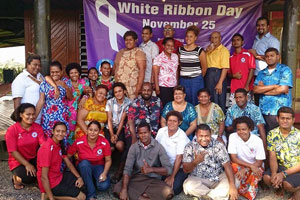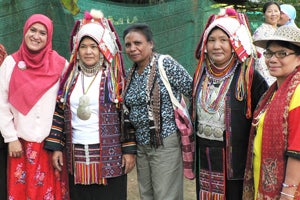Women and the environment
Natural disasters can render women more vulnerable to violence and exploitation. The displacement, stress and trauma experienced by survivors can intensify existing risk factors. For example, according to an OHCHR report, after two tropical cyclones hit Vanuatu in 2011, the Tanna Women’s Counselling Centre reported a 300 per cent increase in new domestic violence cases.
Displacement of indigenous peoples as a result of climate change and environmental disasters can also have violent consequences. According to research and reports from the UN Special Rapporteur on violence against women, its causes and consequences and the UN Special Rapporteur on the rights of indigenous peoples, forced dispossession from ancestral lands can result in violence against indigenous women and girls in particular, including sexual violence, killings and disappearances.
To this end, UN Women is working with partners to develop training and educational materials on gender-based violence for first responders in the Pacific and raising awareness of rights and supporting women’s advocacy against development-related violence. We also advocate for women’s freedom from violence as a goal under both sustainable development and post-2015 development agendas.
In Fiji, first responders train to respond to sexual violence in disasters
Because the risk of violence against women and girls increases in the aftermath of a disaster, UN Women is supporting training and developing educational materials on gender-based violence for first responders and disaster risk reduction planners in Fiji to prevent, recognize and respond to abuse in emergencies across the Pacific. The initiative is supported by UN Women and complemented by a wider community programme aimed at raising awareness, increasing knowledge of violence and its impacts, and giving women a voice.
Indigenous women in Southeast Asia unite against development-based violence
At a consultation supported by UN Women in Chiang Mai, Thailand, 29 indigenous women from eight countries in Southeast Asia met with human rights experts to discuss forms of violence that are worsened or caused by economic development projects. As the Sustainable Development Goals are established, indigenous women need the skills to respond to pressing environmental issues. Through the consultation, women were able to share experiences and develop advocacy plans to deal with such issues.
What the Beijing Declaration says about Women and the environment
Read our Beijing+20 In Focus package on Women and the environment
Go back to UN Women's In Focus compilation on Ending Violence against Women 2014

